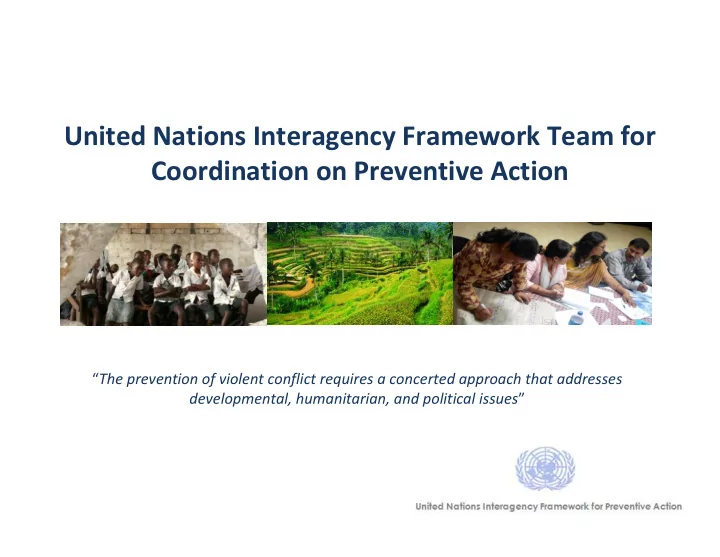

United Nations Interagency Framework Team for Coordination on Preventive Action “ The prevention of violent conflict requires a concerted approach that addresses developmental, humanitarian, and political issues ”
What is the ‘Framework Team’? - Operational since 1995. - Established by DPA, DPKO, and OCHA – focused on coordinating peacekeeping, humanitarian, and political functions; - Shifted focus in 1998 towards early warning and preventive action; - Now composed of 22 UN Agencies; - FT Secretariat established in 2002.
Structure Plenary (Chairs: DPA, UNDP) Expert Reference Group Inter-Departmental (OCHA,UNDP,DOCO,OSAPG, Working Groups PBSO,UNICEF,UNWomen,etc) Working Group Working Group Country 1 Thematic 1 Working Group Working Group Country 3 Thematic 2
Guiding Principles of FT engagement - Informal and Voluntary; - Inclusive and integrated; - Consultative; - Field-driven and field-oriented; - Innovative, flexible, and increasingly systematic; - A catalyst, not a funding mechanism.
FT’s Value Added - Brings UN development, humanitarian, peace, and security actors to work together and helps establish common conflict prevention approaches/ strategies; - Promotes coordination at HQ and agreement on common approaches – reduced pressures on agencies in the field; - Provides an entry point role for agencies that would not normally be consulted on conflict prevention issues; - Provides an entry point to informally discuss politically sensitive issues; - Identifies and draws attention to concerns in countries that are not yet in the international limelight.
Areas of Focus - Country Support; - Thematic Initiatives; - Advocacy.
Country Support - Senior level support for strategy development and programme formulation: - Interagency consultation to assess value-added of FT engagement and requisite technical expertise; - Examples: Mauritania, Ghana, Bolivia - Provide specialized technical resources and inputs for programme implementation: - FT-supported programmes often led by a conflict prevention process specialist (Peace and Development Adviser); - Currently deployed in approximately 30 countries; - Primary focus: to strengthen national capacities to develop and implement conflict prevention initiatives; - Secondary focus: to support internal UN conflict prevention awareness and skills development.
Thematic Initiatives EU-UN Partnership for Conflict Prevention Strengthening Capacities for Sustainable Management of Land and Natural Resources in Conflict Affected and Fragile States: Initial focus on Liberia, Peru, Guinea-Conakry, and Timor-Leste. Online Courses: -‘Natural Resources, Land, and Conflict’. Modules address: land and conflict; renewable resources and conflict prevention; and extractive industries and conflict. -‘Conflict Sensitive Approaches’: Aimed to strengthen capacities and skills to devise conflict-sensitive programming and policy-related activities across the range of UN areas of focus.
Thematic Initiatives Learning Series: -To promote the joint analysis of current challenges and opportunities relating to conflict prevention that are relevant for the work of FT agencies. -‘Food Insecurity’, October 2011 -‘Human Rights and Conflict Prevention’, April 2012 Working with the Inter-Agency Network for Education in Emergencies: -Promoting conflict-sensitive approaches to education in fragile contexts to influence decision-makers at all levels by: -Reflecting on current approaches, building on best practice, and seeking to devise practical questions to guide field practitioners to devise conflict-sensitive education initiatives in fragile contexts.
Advocacy - Support provided to the Conflict Prevention Community of Practice; - ‘Brown Bag Lunch’ Series: hosting innovative, inspirational, and renowned individuals and organisations undertaking work relating to conflict prevention around the world; - Briefings and Trainings
Opportunities and Challenges - Early identification – a forum for early warning and early response - Timely support to UNCTs, ensuring interagency engagement at HQ and in the field; - Capturing the impact: monitoring, evaluation, and reporting; - Increasing awareness and capacity at HQ and the field with regard to conflict prevention, conflict sensitivity, etc.; - Enhancing effectiveness and rapidity of support provided to RCs and UNCTs, especially in complex political situations; - Continuing to engage with interested agencies on country-specific engagements and thematic issues that apply across the UN system.
Early Identification - Providing a forum for early warning, early response, and coordinated response to Resident Coordinators. - Examples: Malawi, Belarus? - Drawing on existing analyses (including the IASC Early Warning Report’s “On Watch” countries) and applying a ‘long-term’ prevention lens
Recommend
More recommend